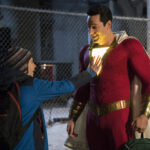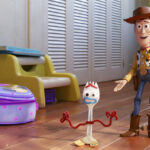
Winston Duke, Lupita Nyong’o and Evan Alex in “Us.” (Claudette Barius/Universal Pictures via AP)
Tamara’s Take
Filmmakers try to leave their mark on a genre with trinkets appearing throughout their movies. Horror has been the one theme in which these creators had have the most lasting impression. Jordan Peele’s latest in the horror realm “Us” continues his need to show audiences the ugly truth – this time replacing the teacup from “Get Out” with red jumpsuits and shiny scissors.
“Us” unfolds through 1986 flashbacks and present day mostly from the perspective of matriarch Adelaide Wilson (Lupita Nyong’o), recalling a time she was frightened while at Santa Cruz Beach in California as a child and the paranoia she has as an adult when her own family are going on a vacation in the same area. Her husband, Gabe (Winston Duke), is the corny, happy-go-lucky dad with Zora (Shahadi Wright Joseph) as the cellphone-obsessed daughter and Jason (Evan Alex) as the playful son. The Wilsons are friends with the Tylers (Elisabeth Moss and Tim Heidecker), a more well-to-do couple that Adelaide and Gabe try to keep up with in a materialistic way.
But coincidences pop up throughout the Wilsons’ getaway, heightening Adelaide’s anxiety, and it all comes to a head when the family is visited by a group of hand-holding doppelgangers, known as the Tethered, sporting red jumpsuits and refusing to leave without a fight. Red (also Nyong’o) leads the scissor-armed family that she insists has been forced to live underground, in the shadows, while Adelaide could stay in the sun. How can the Wilsons survive when their tormentors look and act like them?
Peele’s second film is a spiritual cousin to “Get Out” with both movies featuring a protagonist forced to confront childhood trauma while trying to stay alive in the present. While it’s heavy in symbolism and cinematic tributes, it would be unfair to say that “Us” is a knock-off of the films and issues Peele brings forth. He keeps it fresh with the casting and tone, and he keeps the suspense going. There are moments of light humor, usually reserved in a space where audiences aren’t used to seeing. Duke’s cheesy father routine as Gage is something that is never portrayed by a 6-foot, 5-inch guy or by a man of color. He is clueless, almost in a Chevy Chase or Tim Allen way, that it is believable that he would have something to be afraid of.
With the symbolism, you may need a movie lover’s guide book, the Bible, a color theory test and the brief history of Reaganomics in order to catch all the Easter eggs (and there are rabbits, more than the ones that are in “The Favourite”). There are the obvious ones, like “Jaws” and “Funny Games,” but the subtle ones, including two Paul Thomas Anderson movies.
But in between deciphering what Peele is trying to convey on screen and what scares he has up his sleeves is a nerve-wracking performance by Nyong’o. In the years between her Oscar win for supporting actress in “12 Years a Slave,” Nyong’o has only been in more supporting roles or hidden behind CGI and voice work. This time, she’s in full command, going from anxious loner to worried mom to fighter as Adelaide, plus pulling a double role with a haunting voice as Red.
Music is probably the best actor of all in “Us.” The trailer brought back Luniz’s “I Got 5 on It,” and this track goes through more transformations and torture than any character on screen. It goes from a headbopper to a “Girl, you better run” anthem. And more informed audience members may start thinking about the song sampled on the track, Club Nouveau’s “Why You Treat Me So Bad,” you’re probably not wrong about how that song works in the film, too, particularly when composer Michael Abels mixes it into the score.
“Us” will stay with you for a few days, and you may need a second viewing. At face value, Peele could do without retracing some of the steps he took in “Get Out,” but compared to mainstream horror offerings, “Us” is bringing it back to its creepy roots.
4 out of 5 stars

Lupita Nyong’o in a scene from “Us.” (Claudette Barius/Universal Pictures via AP)
Rebecca’s Take
Two years after “Get Out” became a cultural phenomenon, Jordan Peele continues to establish himself as a father of modern horror with “Us.” The writer-director’s sophomore effort is relentlessly chilling, unnerving and brutal.
“Us” is a visceral roller-coaster, ramping up the tension at every turn – and there’s a lot of them. Unlike “Get Out,” “Us” is more of a genre film than social commentary, playing to and against the conventions of horror. But Peele still holds up a mirror to our country in a film that’s rich in meaning while doubling down on the scares.
The film follows the Wilson family – mom Adelaide (Lupita Nyong’o), dad Gabe (Winston Duke), daughter Zora (Shahadi Wright Joseph) and son Jason (Evan Alex) – during their summer vacation in Santa Cruz. Reluctant to go to the beach, Adelaide is troubled by memories of a childhood trauma she experienced there years earlier.
As strange coincidences pile up, her worst fears come to pass when her family comes face-to-face with their evil doppelgangers. Terrorized by their own doubles, Adelaide, Gabe, Zora and Jason are thrust into a deadly game of cat-and-mouse as they must battle their shadow selves in order to survive.
The less you know about the plot of “Us” going into it, the better. Peele weaves a tale of terror that sprouts from a relatable seed – an average family going on vacation – into a sprawling mystery that makes you question what you think you know. Dropping one surprise after another, Peele reels in moviegoers while keeping them perched on the edge of their seats. There are clues spread throughout, but it’s up to us to decipher them.
The film isn’t gory, but it does get bloody. “Us” subverts horror tropes while leaning into them. When the music cues up to put the audience on edge, that’s also when Gabe cracks a joke, giving viewers a break from the tension. Peele blends humor and terror in an unexpected way that amplifies the other.
“Us” isn’t just a home invasion thriller. It’s a home invasion where the invaders aren’t strangers, but the main characters themselves. The doppelgangers are animalistic, guttural and bloodthirsty, a dark reflection of the Wilson family. “Us” causes us to look inward as it delves into the theme that we are our own worst enemy. By the time the film ends, it will make you question who the monster is – if there’s a real monster at all – or just victims.
It’s an American story, as “Us” can also mean “U.S.” Peele sprinkles in red, white and blue imagery throughout the film, from the doppelgangers’ red jumpsuits, Adelaide’s white outfit and the ocean’s blue hues. The film recognizes that we live in a divided country – not by race, as “Get Out” explored, but by economic standing. The Wilsons often compare themselves to their neighbors, the Tylers (Elisabeth Moss and Tim Heidecker), who recently bought a fancy new car. “Us” questions how far we are willing to go to rise above our station.
In a film that grows more twisted with every scene, “Us” is anchored by Nyong’o’s incredible dual role. After doing voicework for films like “The Jungle Book,” “Star Wars: The Force Awakens” and its sequel, “The Last Jedi,” the Oscar winner thankfully re-emerged in front of the camera again in last year’s smash “Black Panther.” In “Us,” she gives an emotionally wrought performance.
As Adelaide, Nyong’o is fierce yet vulnerable as a protective mother and wife suffering from post-traumatic stress syndrome. But as Adelaide’s doppelganger, Nyong’o must portray a different, darker side of the same coin. She does both beautifully as the audience looks to her as the story unfolds. Duke is warm and goofy as a father trying to make sense of it all. The youthful Joseph and Alex demonstrate a resilience beyond their years as the siblings are forced to fend for themselves.
An excellent follow-up to “Get Out,” “Us” shows Jordan Peele is no fluke. The horror maestro has more original stories up his sleeve to contribute to the genre. Those expecting more overt social commentary may be a little disappointed as the film is more open to interpretation. But like “Get Out,” “Us” keeps you thinking – and talking – long after the credits roll, forcing us to take a deeper look at ourselves.
4 out of 5 stars

Rebecca Kivak and Joe Baress write about movies for Take 2 blog. Together, they review current flicks and offer their insights into the latest movie news. Rebecca is a copy editor and page designer at The Times-Tribune. She started her career with Times-Shamrock Newspapers in 2005 and has won several professional journalism awards for page design and headline writing. She also covers NASCAR races from Pocono Raceway. Contact: rkivak@timesshamrock.com; 570-348-9100 x5126; @TTRebeccaKivak


